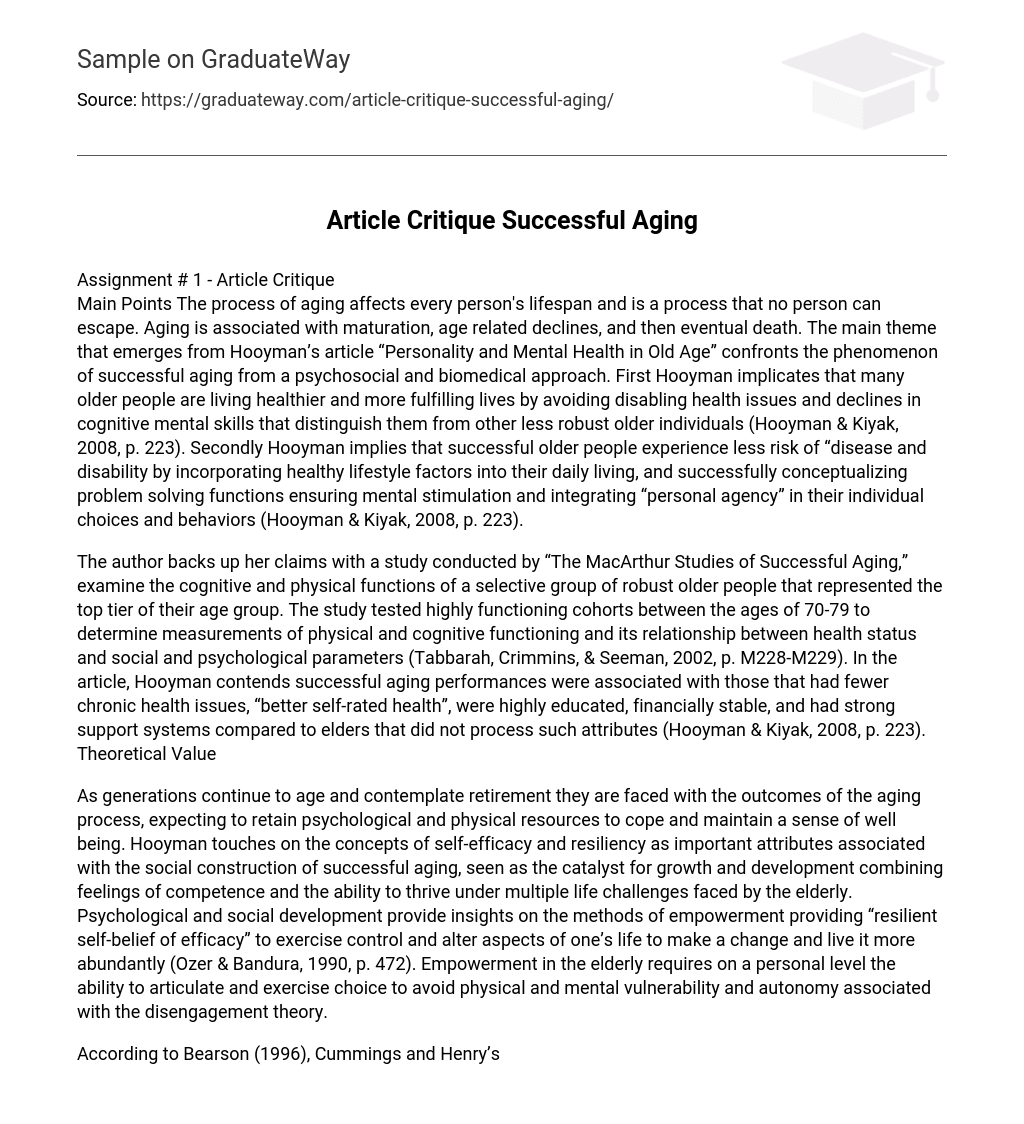Main Points The process of aging affects every person’s lifespan and is a process that no person can escape. Aging is associated with maturation, age related declines, and then eventual death. The main theme that emerges from Hooyman’s article “Personality and Mental Health in Old Age” confronts the phenomenon of successful aging from a psychosocial and biomedical approach. First Hooyman implicates that many older people are living healthier and more fulfilling lives by avoiding disabling health issues and declines in cognitive mental skills that distinguish them from other less robust older individuals (Hooyman & Kiyak, 2008, p. 223).
Secondly Hooyman implies that successful older people experience less risk of “disease and disability by incorporating healthy lifestyle factors into their daily living, and successfully conceptualizing problem solving functions ensuring mental stimulation and integrating “personal agency” in their individual choices and behaviors (Hooyman & Kiyak, 2008, p. 223).
The author backs up her claims with a study conducted by “The MacArthur Studies of Successful Aging,” examine the cognitive and physical functions of a selective group of robust older people that represented the top tier of their age group. The study tested highly functioning cohorts between the ages of 70-79 to determine measurements of physical and cognitive functioning and its relationship between health status and social and psychological parameters (Tabbarah, Crimmins, & Seeman, 2002, p. M228-M229).
In the article, Hooyman contends successful aging performances were associated with those that had fewer chronic health issues, “better self-rated health”, were highly educated, financially stable, and had strong support systems compared to elders that did not process such attributes (Hooyman & Kiyak, 2008, p. 223).
As generations continue to age and contemplate retirement they are faced with the outcomes of the aging process, expecting to retain psychological and physical resources to cope and maintain a sense of well being. Hooyman touches on the concepts of self-efficacy and resiliency as important attributes associated with the social construction of successful aging, seen as the catalyst for growth and development combining feelings of competence and the ability to thrive under multiple life challenges faced by the elderly.
Psychological and social development provide insights on the methods of empowerment providing “resilient self-belief of efficacy” to exercise control and alter aspects of one’s life to make a change and live it more abundantly (Ozer & Bandura, 1990, p. 472). Empowerment in the elderly requires on a personal level the ability to articulate and exercise choice to avoid physical and mental vulnerability and autonomy associated with the disengagement theory.
According to Bearson (1996), Cummings and Henry’s disengagement theory (1961) postulates as the elderly age, many gradually become disenfranchised, disengaged, and withdraw from “social roles in capabilities of diminished interest” assuming roles of passivity while preparing for death (Bearson, 1996). This is in complete contrast to Havighurst’s activity theory that claims as the elderly age staying mentally and physically active preserves life satisfaction and perseverance (Lemon, Bengtson, & Peterson, 1972, p. 511).
Hooyman concludes with her agreement with Erickson and other theorists that the development of the personality does not stabilize in early adulthood but continues to develop, change and evolve well into the twilight years. Erickson believed that developmental stages in his psychosocial theory continues to develop, superseded and impacted each stage furthering development as a person age as generativity become an important aspect of active aging (Hooyman & Kiyak, 2008, p. 256).
From the scope of enhancement of human behavior, the article defines the enhancement of successful physical, cognitive, and emotional aging, emphasizing physical health and outcomes of freedom from disease and disability as criteria of successful aging. The uniqueness of the article can be explained from the perspective of the theory of gerotranscendence, a developmental process in human development that optimizes the process extending into old age, “redefining the meaning of self, relationships, and development of new understanding of the fundamentals of existentialism” (Wadensten, 2005, p. 381-382).
Overall Evaluation Aging can be considered abstract in context as the continuation of the life cycle, as people age and come to the realization that life is not finite. Some quickly adjust and immediately embrace this new and exciting time in their lives, whereas others struggle and cannot adjust or identify with the impending changes of aging. From the standpoint of social work; successful aging should be viewed as a continuum of achievement with measurements of progress in devoting time and effort in improving the activities and lifestyles that anticipate positive change and acceptance of one’s station in life. From the spectrum of weaknesses of successful aging, adjustment is the key to acceptance, but adjustment is based on options available to all across the course of life.
In social work, all limitations must be taken in account for those that have been historically disadvantaged by lack of resources, declining health, low-income, minority status, and those that have been disengaged in succeeding in the precepts of successful aging (Hooyman & Kiyak, 2008, p. 226). Empowerment in the elderly populations requires identification of disempowerment that constrains social, physical, personal, and cognitive spheres affecting older people.





